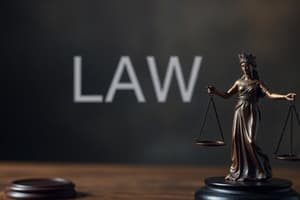Podcast
Questions and Answers
What is the primary focus of criminal law?
What is the primary focus of criminal law?
- Prosecution of crimes and determination of punishments (correct)
- Interpretation of the constitution
- Regulations created by government agencies
- Disputes between individuals or organizations
Which type of law governs the relationship between different countries?
Which type of law governs the relationship between different countries?
- Administrative Law
- Criminal Law
- International Law (correct)
- Constitutional Law
Which legal principle ensures that individuals are treated equally under the law?
Which legal principle ensures that individuals are treated equally under the law?
- Due Process
- Rule of Law (correct)
- Jurisdiction
- Precedent
What term is used to describe the party who initiates a lawsuit?
What term is used to describe the party who initiates a lawsuit?
What mechanism allows courts to follow past judicial decisions?
What mechanism allows courts to follow past judicial decisions?
Which of the following is NOT considered a primary source of law?
Which of the following is NOT considered a primary source of law?
What is the role of mediation in the legal context?
What is the role of mediation in the legal context?
What encompasses the criminal justice system?
What encompasses the criminal justice system?
Flashcards are hidden until you start studying
Study Notes
Definition of Law
- A system of rules created and enforced through social or governmental institutions.
- Governs behavior and maintains order in society.
Types of Law
-
Criminal Law
- Deals with crimes and their punishments.
- Involves prosecution by the state against individuals.
-
Civil Law
- Handles disputes between individuals or organizations.
- Includes contracts, property, and family law.
-
Administrative Law
- Governs the activities of administrative agencies.
- Involves regulations and rules created by government bodies.
-
Constitutional Law
- Involves the interpretation and application of the constitution.
- Protects individual rights and regulates government powers.
-
International Law
- Regulates relations between countries.
- Includes treaties, conventions, and customary international practices.
Sources of Law
- Statutes: Laws enacted by legislatures.
- Case Law: Law established through judicial decisions.
- Regulations: Rules made by executive agencies.
- Customary Law: Practices accepted as legal obligations.
- International Treaties: Agreements between states recognized as binding.
Legal Principles
- Rule of Law: The principle that law applies equally to all individuals.
- Due Process: Fair treatment through the normal judicial system.
- Precedent: Judicial decisions that influence future cases.
The Legal System
- Court Structure: Different levels (e.g., trial courts, appellate courts, supreme courts).
- Legal Professionals: Includes judges, lawyers, and paralegals.
Key Concepts
- Jurisdiction: The authority of a court to hear a case.
- Litigation: The process of taking legal action.
- Mediation and Arbitration: Alternative dispute resolution methods outside of court.
Important Legal Terms
- Plaintiff: The party who initiates a lawsuit.
- Defendant: The party being accused or sued.
- Verdict: The decision made by a jury or judge.
Law Enforcement
- Role of Police: Enforce laws, maintain public order, and prevent crime.
- Criminal Justice System: Includes law enforcement, courts, and correctional facilities.
Recent Trends in Law
- Technology and Law: Impact of digital evidence, data privacy, and cyber law.
- Human Rights Law: Growing focus on international human rights standards.
Conclusion
- Law is a dynamic field that adapts to societal changes and cultural values. Understanding its various components is essential for navigating legal issues effectively.
Definition of Law
- Law consists of a system of rules enforced by social or governmental institutions to regulate behavior and maintain societal order.
Types of Law
- Criminal Law: Addresses crimes and sanctions imposed by the state; prosecution is conducted against individuals.
- Civil Law: Concerns legal disputes between individuals or organizations, covering areas such as contracts, property disputes, and family matters.
- Administrative Law: Regulates the actions and procedures of governmental agencies; includes rules and regulations established by these bodies.
- Constitutional Law: Focuses on the interpretation and application of the constitution, protecting individual rights while defining government powers.
- International Law: Governs relationships between nations; includes treaties, conventions, and established customary practices.
Sources of Law
- Statutes: Legislative enactments that create binding laws.
- Case Law: Legal principles established through judicial decisions in previous court cases.
- Regulations: Rules created by executive agencies to enforce statutes.
- Customary Law: Recognized legal obligations based on societal practices.
- International Treaties: Binding agreements recognized among states.
Legal Principles
- Rule of Law: Ensures that laws apply equally to all individuals, regardless of status.
- Due Process: Guarantees fair legal treatment within the judicial system.
- Precedent: Prior judicial decisions that shape the outcomes of future cases.
The Legal System
- Court Structure: Comprises various levels, such as trial courts, appellate courts, and supreme courts, each with defined functions.
- Legal Professionals: Includes judges, lawyers, and paralegals who play essential roles in the legal process.
Key Concepts
- Jurisdiction: Defines a court's authority to hear a specific case.
- Litigation: Refers to the legal process of resolving disputes through the judicial system.
- Mediation and Arbitration: Alternative methods for resolving disputes outside traditional court proceedings.
Important Legal Terms
- Plaintiff: The individual or group that initiates a lawsuit.
- Defendant: The individual or entity accused or being sued in a legal case.
- Verdict: The final decision rendered by a judge or jury in a court case.
Law Enforcement
- Role of Police: Enforce laws, ensure public safety, and deter criminal activities.
- Criminal Justice System: Encompasses law enforcement agencies, court systems, and correctional institutions.
Recent Trends in Law
- Technology and Law: Adaptation to challenges posed by digital evidence, data privacy concerns, and the emergence of cyber law.
- Human Rights Law: Increased emphasis on adherence to international human rights standards.
Conclusion
- The field of law continually evolves, reflecting changes in society and cultural values. Understanding its various components is crucial for effective navigation of legal issues.
Studying That Suits You
Use AI to generate personalized quizzes and flashcards to suit your learning preferences.




